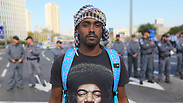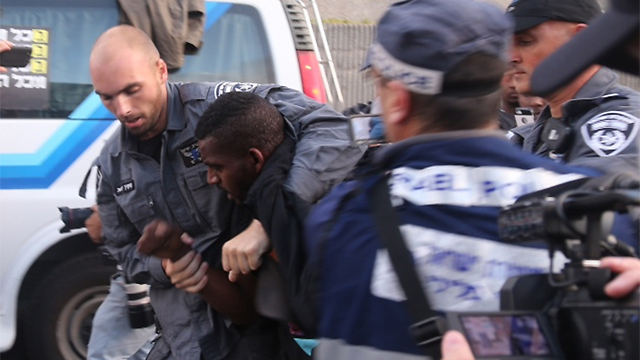
The IDF as an example of racial equality
Op-ed: The army is almost the only place in Israel where one sees members of the Ethiopian community fulfilling all roles and positions.
On Sunday I encountered one of the protesters who was on his way to Azrieli Junction. "I can't wait for reserve duty," he said to me. "Why?" I asked. "Wasn't a month during Operation Protective Edge enough for you?" And he replied: "Only in uniform do I truly feel equal in Israeli society."
Absurdly, the demonstrations of the past few days were sparked by an incident in which police officers brutally assaulted an Israel Defense Forces soldier. It's absurd, since the IDF is one of the few places in Israeli society in which members of the Ethiopian community fit in as equals.
Instead of touting populist slogans, it would be a good idea for all those who are now hopping onto the bandwagon of the Ethiopian community's struggle to pay a visit to the IDF and get a lesson in how things can be different.
The IDF, which played a major role in bringing the Ethiopian Jews to Israel first in Operation Moses and then in Operation Solomon, is almost the only place in Israel where one sees members of the Ethiopian community fulfilling all roles and positions.
True, they have yet to rise to the most senior ranks; but there's already an Ethiopian battalion commander, three officers with the rank of lieutenant colonel, and 44 with the rank of major. Ethiopians serve in elite special-forces units such as Sayeret Matkal, Shaldag and Shayetet 13, and in various other combat roles too; they are starting to make their way into the IDF's technology units; and their participation in officers' training courses is also on the rise.
There's still a long way to go: The percentage of soldiers from among the Ethiopian community who end up in military prisons is three times higher than the general average; and approximately 22 percent of the Ethiopian soldiers drop out of the army, as opposed to the overall average of 16.5 percent.
On the other hand, 88 percent of the Ethiopian youth enlist in the IDF, compared to the national average of just 74 percent, with some 40 percent volunteering for combat duty, as opposed to the average of 35 percent among soldiers in general.
Yes, there is room for improvement in the IDF too. Chief of Staff Gadi Eisenkot, for example, should have condemned the brutal assault on the soldier without hesitation; but Eisenkot, who detests populism, didn't want to get into a confrontation with the Israel Police.
On Sunday morning, Eisenkot called Damas Pakada, the soldier who was beaten. "Look after our community," Pakada asked of the chief of staff; and Eisenkot promised to do so.











